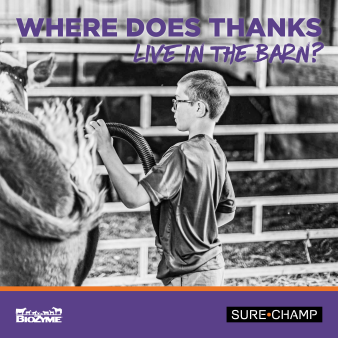
Junior Nationals are a great time to reconnect with old friends and make new ones. It’s also a time to showcase the cattle you’ve been working on all spring. And for some young people, it is an opportunity to refine and build new skills in the spirit of competition. For those who like the chance to practice their selling and marketing skills, the sales contests are a great way to learn and improve some talents you will likely use your entire life.
As Nick Fitzsimmons, owner of Fitz Genetics at Perry Oklahoma, and Regional Sales Representative and Director of Cattle Sales for Oklahoma and West Texas for Sunglo, points out, having some practical sales and public speaking skills is important, and useful for young people to learn regardless of if they sell livestock, feed or cars later in life.
“It’s important to remember not everyone is comfortable in this scenario of speaking or selling to strangers. Not everyone is perfect, but everyone that gets out there and tries is trying to improve their skills,” he said.
Fitzsimmons competed in Simmental sales contest as a junior, and recalls the competition was a fun one, while offering real-world value. John Reasor, founder and owner of Reasor Co. outside of Des Moines, Iowa, a consulting and marketing firm, also competed in the sales contests as a junior at both the Shorthorn and Angus junior shows. He agrees that the sales contest offers an opportunity to perfect the art of selling while learning more about your animal.
“The sales contest gives young people a real-life experience to use their knowledge of their animal and the industry to sell their animal to someone involved in the industry or their breed,” Reasor said.
Fitzsimmons and Reasor, both former Sure Champ® interns offer four tips to help you #PreptoWin in the sales contest at your breed’s junior national.
- Be Comfortable
Reasor and Fitzsimmons agree that if given an option to choose any animal to sell, you should select the one you are most comfortable talking about. This could be your show heifer, a cow-calf pair or even a bull, as long it fits within your contest rule parameters. Be sure you have an animal that you are familiar with and you can most comfortably talk about its strengths.
Be sure to discuss both its phenotypical strengths and its pedigree. Fitzsimmons suggests that your sales pitch should be about a 50/50 split of visual appraisal and genetics, including pedigree and EPDs, which allows the judges to know that you are in-tune with the industry and the breed that you are selling.
- Start with Introductions
Before you even start talking about your animal, take a few moments to introduce yourself and your team or your cattle handler. Ask the judges to introduce themselves and ask them about their operation, which also helps you to know your audience who you’re selling to. This might even give you an opportunity to change up part of your talk if you find out the judges are looking for a donor cow, but you were originally selling a show heifer.
- The Power of Three
Reasor suggests picking three solid strengths of your animal to focus on and highlight those. Yes, the animal might have a lot more strengths, but hit the high points since your time is likely limited and you want to keep the potential buyers’ or judges’ attention.
Since you have made introductions, and you know a little bit about your buyers, you can tell them what value the animal will bring to their operation. Perhaps, the animal offers growth potential, outstanding structure or maternal traits that the buyer is needing.
- Ask for the Sale
You’ve made introductions, presented your animal and now you need to ask for the sale. Be sure to have a price in mind for your animal. Fitzsimmons suggests that you talk to a parent or advisor to have a price point in mind, and have some wiggle room for negotiating, if you are a little out of the buyer’s price range. He said negotiation is perfectly acceptable as is asking to retain embryos or semen interest, but he suggests the buyer should be offered possession.
Most of all, have fun! Selling isn’t a skill that comes easily for everyone, but if you think of it as more of a conversation, the contest might seem simpler. Although it is good to know about your animal, the breed and the industry and even practice what you are going to say, don’t come across too rehearsed. Stay genuine and personable. After all, those producers out there on sale day are simply having a conversation with you. Use these tips to help you prepare for your sales talk and with practice, you will win the banner and experience!

